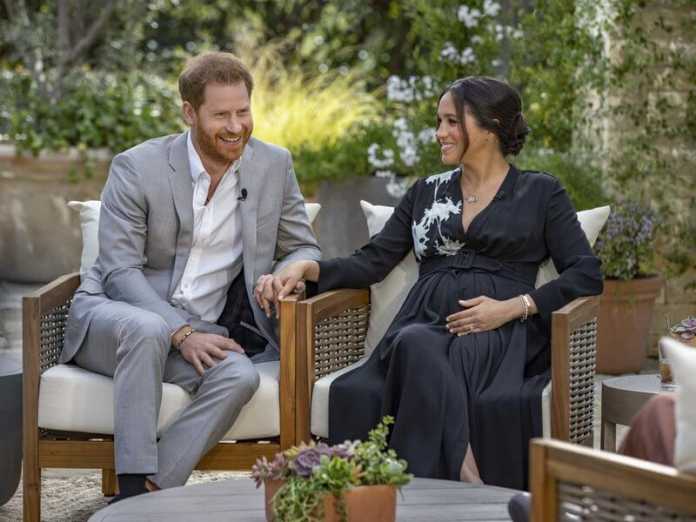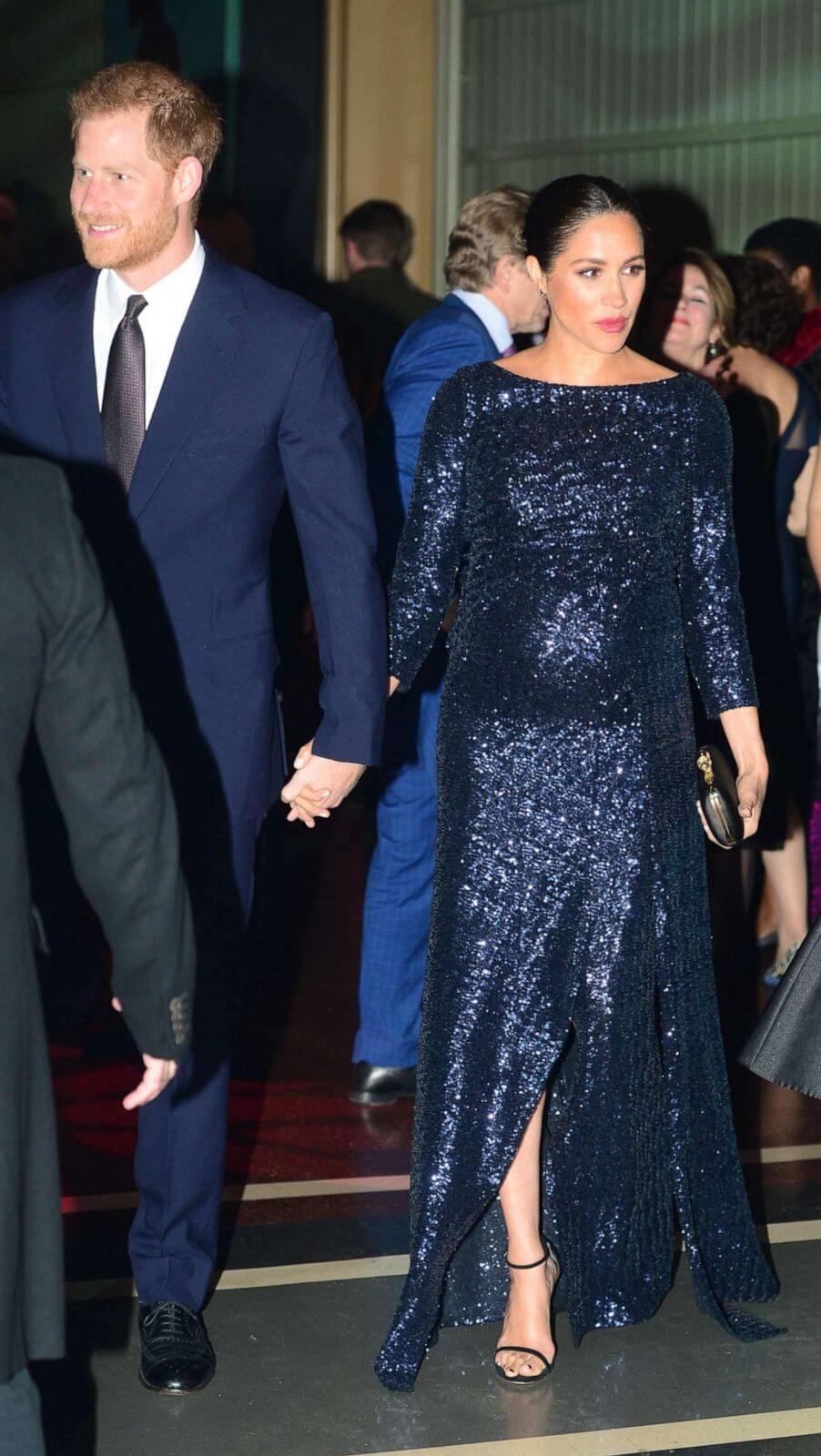A little over 17 million Americans watched Meghan Markle and Prince Harry bare their souls on national television with talk show goddess Oprah Winfrey, oblivious of the paramount effect of setting off a call for worldwide empathy in doing so.
The two-hour CBS special has the couple adamant to take control of the dwindling narrative the UK press have painted them in since the start of the relationship, as Meghan intimately details the many troubles she faced over British media’s heavily controlled royal reporting.
To a UK audience, the Oprah Winfrey interview came across a little tongue in cheek: the lush sofas, soft lighting, LA colloquialism buzzwords, it read too much like a melodramatic Hollywood special than it was a grave tell-all commenting on a dynasty’s historic oppression. The entire set-up from the get-go is already miles away from how the Royals are known to be perceived, through their sporadic annual Christmas speeches and the occasional TV weddings.
Where tight-lipped senior royals pride themself in being discreet, Meghan Markle and Prince Harry took accessibility to a whole new level. They were more than open with their thoughts, but were also generous with their sincerity.
While blue bloods might have trouble getting past the dramatisation and sensation surrounding the couple, much of the actual conversation in the interview was anything but glamorous. The couple, at their heart, appeared desperately sad.
This was palpable throughout the entire interview, especially for Meghan. Perhaps one of the most arguably spellbinding and somber highlights of the sit-down interview was when she opened up about her suicidal ideations during her time as a senior royal.
“I was really ashamed to say it and ashamed to admit it to Harry,” Markle told a visibly stunned Winfrey. “But I knew if I didn’t say it, that I would do it. I didn’t want to be alive anymore. That was a very clear and real and frightening constant thought.”
Meghan opened up to Winfrey about not only struggling with suicidal thoughts, but also struggling to be able to get mental health help for it altogether. “I went to the institution, and I said that I needed to go somewhere to get help. I said that, ‘I’ve never felt this way before, and I need to go somewhere,’ and I was told that I couldn’t, that it wouldn’t be good for the institution,” said Meghan. “I went to one of the most senior people (in the institution) just to get help.”
“I share this because there’s so many people who are afraid to voice that they need help,” she added. “And I know personally how hard it is to not just voice it, but when you voice it to be told, ‘No.'”
Her mental health struggles she described to Winfrey took place a year prior to the COVID19 pandemic, when Meghan was pregnant with Archie and they were still living in the United Kingdom, taking on full-time roles as working members of the royal family.
Her anger and disappointment when detailing her struggles were visibly seen, but it was her vulnerability that was perhaps most compelling.
The way she spoke of the darkest times in her life with a languid grace that could only befit her braveness, and to be able to speak about such deeply intimate thoughts with full control of her person was nothing short of admirable.
Meghan’s heartwrenching story of attempting to survive the clutches of the British royal family is more than one of a shunned woman, it tells of a deeper understanding of how an institution whose power is built upon a concoction of wealth, whiteness, colonialism, imperialism, and a vaguely persistent ode to the divine right of kings was, not for the first time, challenged. Not only by a woman, but as an outsider who did not share the same privileges as one would a white noble.
It is very much a journey of her fight towards systemic oppression as a woman of colour amidst an outdated, relatively consertative Britain that holds white supremacy like a badge of honour. She goes on to describe the kind of life she led in the centre of such an institution: isolated, controlled, and under intense scrutiny.
Meghan revealed she once had to give up her passport, keys, and drivers license so as to limit her mobility. The “firm” even went as far as denying her permission to meet her friends for lunch, claiming she was already oversatured in the media and shouldn’t be seen out in public for a while. She looks to this intense micromanagement of her life as one of the primary reasons for her mental state to spiral downward.
Meghan said she found support from Prince Harry, but even he admitted he “went to a very dark place as well” and struggled to get help for his wife.
“I had no idea what to do. I wasn’t prepared for that,” Prince Harry admitted, adding that he did not reach out to his family members for help with Meghan’s mental health struggle.
“I guess I was ashamed of admitting it to them,” he said. “I didn’t have anyone to turn to. We’ve got some very close friends that have been with us through this whole process, but for the family, they very much have this mentality of, ‘This is just how it is. This is how it’s meant to be. You can’t change it. We’ve all been through it.'”
Meghan recalls a particular night in January 2019, when she was roughly six months pregnant with Archie, of an event in Royal Albert Hall in London they had to make an appearance for. “I remember Harry saying, ‘I don’t think you can go,’ and I said, ‘I can’t be left alone,'” she admitted.
The openness Meghan and Prince Harry told of their various struggles is not something often publicly revealed by the average person dealing with their own share of woes, much less high-profile figures of a literal empire.
It’s hard to connect the idea of struggle with royalty; people have to take on a suspension of belief to associate their worries as legitimate and not chalk it off to privileged champagne problems. But with the way these two spoke of their own internal wounds, separately and then as a couple, spoke volumes of their emotional intelligence and willingness to heal from their respective trauma.
In Prince Harry’s case, his decision to let the world know of his pain and be vulnerable in a manner most modern men are not, can be a potentially moving step towards the path of genuine mental healing. Here is a literal prince, brought up in a palace and is for all intents and purposes genuine royalty, but he is also human. The underlying message he sends for in the interview, in that there is power in vulnerability and honesty, is one that can benefit young boys and grown men alike.
The couple’s deep revelations of their struggles about mental health, uncertainties about the future, and such other concerns in front of one of the biggest names in TV can have a profound effect in shaping the way viewers think of their own demons to bear.
If the late Princess Diana planted the seeds of the compassion and vulnerability movement that propelled her to icon status, Meghan and Prince Harry are here to see the fruits of her ideals grow and prosper by wearing their openness and honesty as their own badge of honour.
About the Author
Pamela Rhyan is a writer for The World Financial Review. She crafts timely blog pieces about trending business acumen, changing leadership dynamics, emerging finance and technology trends, and how these spaces intersect from a millennial’s perspective. She also works as an editor and content strategist to the sister publications of The World Financial Review.





































































